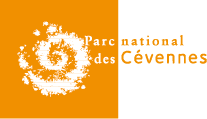
The Tour des Puechs (by mountain-bike)
Te Tour des Puechs is for mountain-bikers looking for a challenge. A warm-up stretch on the small lane to La Baume leads up to a long ascent to Issenges, which is strenuous because it is initially so steep. As you pass below the Eschine d'Aze, you get a good look at the two buttes of Les Bondons, local geological curiosities.
8 points of interest

Chèvre de race alpine - © Olivier Prohin AgricultureThe Gautier goat farm
Yolande and Christian run a small farm where they make farmhouse goat's cheese, a typically Cévenol product. Their herd consists of 60 Alpine dairy goats, and all their milk is processed on-site into farmhouse cheese. From late November to late April, the nanny goats have a break so their little ones can feed!

Château d'Arigès - © com com Florac Sud Lozère  History
HistoryChâteau d’Arigès
This can be seen on your left, in a gap in the forest. It was only a share-cropping farm, whose buildings were in ruins, when the Lord of Issenges bought it in 1658. He lived in it from 1688. This Château, which is no doubt more comfortable than the « maison carrée » (“square house”), was built in a river bend of the Tarn and is surrounded by fertile soils well-suited for crop-growing.

Troupeau de brebis - © com com Florac Sud Lozère  History
HistoryTranshumant history
“I moved my sheep to summer pastures all the way in the Margeride. I'm from up there myself. When I was a kid, there were many of us in the family, and whenever we saw a transhumant [seasonally migrating] shepherd pass by, my dad would say: one day you'll have to go off with a shepherd... I left and became a transhumant shepherd. My first stopover was Bonperrier. Then we'd eat at L'Hospitalet, and go down to Florac for the night. I moved pastures with 4,000 sheep.”

Draille de la Margeride - © CC Florac Sud Lozère  Pastoralism
PastoralismThe draille de la Margeride
The ascent to Issenges is on the draille de la Margeride. A draille is a path used by herds of goats during the transhumance: moving up to the mountain pastures in June and coming back down again in September.

Le manoir d'Issenges - © CC Florac Sud Lozère  Architecture
ArchitectureThe Manoir d'Issenges
This fortified house, built from 1624 onwards, is an example of a type of rural seigneurial estate inherited from the Middle Ages. The complex consists of three buildings: the main building with its almost square ground plan, and two long and low wings of farm buildings, which together enclose a courtyard open to the gardens to the east. The entrance is via an archway located at the southern corner of the main building. This building must have had four corner turrets, a projecting tower in the centre that contained the spiral staircase, and an entrance topped by a pediment. This fortified look was reinforced by musket slits and a parapet, or at least a brattice over the entrance gates. The turrets have been demolished and the central tower reduced in height. The mullioned windows have been preserved. A stone shows the date of 1624.

Les puechs des Bondons - © Nathalie Thomas  Geology
GeologyThe puechs at Les Bondons
“These are two humps that stick out of the plateau of the Cham des Bondons by about a hundred metres: the truc de Miret and the truc des Bondons (truc is Occitan for mound). These layers of grey marl bear witness to the time when the Jurassic sea was at its deepest. Local legend has it that Gargantua had gone to plough on the Causse Méjean, and later crossed the valley of Ispagnac to knock the crud off his clogs before returning to his own land on granitic Mont Lozère, where clay is practically non-existent.” Revue Cévennes, issue 23-24

Village de Malaval - © CC Florac Sud Lozère  Water
WaterMalaval hamlet
Malaval, built on the floor of a narrow valley, has the distinctive feature of getting its water supply from a water catchment that draws on an underground river, which flows under the limestone plateau for about 12 km. “This is an underground diversion from the Lot river basin to the Tarn river basin, which is known for its geological interest and especially its concretions.” Revue Cévennes, issue 23-24

Châtaignier en fleur - © Nathalie Thomas  Flora
FloraThe sweet-chestnut grove
The chestnut grove borders the former track from Chadenet to Bédouès. Many other species (oak, ash, hazelnut) have settled in this grove since it stopped being exploited 50 years ago. “Towards Chadenet, trees were cut for the tannins, they were cut before the Great War. My father worked there, bringing the trees down the mountain with oxen. There were four or five of them, each with his pair of oxen, and they brought it all down by the track all the way to Pontèze.”
Description
Mountain-bike route #11. From the car park at the village hall, exit right onto the D 998. After a few metres, turn right towards La Baume. Immediately after the bridge, turn left and cycle along the Tarn to the Terre Rouge housing scheme. Before you get to the village de vacances (holiday village), turn right for the climb towards Issenges (GR 43). Keep going straight. Below the Eschine d'Aze, follow the track on the right towards Les Puechs. Before you get to the D 135, take the track on the right to go downhill to Malaval and then Malbosc. Take the road leading to Chadenet and go downhill on a magnificent path that will take you to Cocurès. Join up with the D 998 and cross the bridge to return to Bédouès.
- Departure : Bédouès
- Arrival : Bédouès
- Towns crossed : Bédouès-Cocurès, Florac Trois Rivières, Les Bondons, and Ispagnac
Forecast
Altimetric profile
Recommandations
No cycling off-track. You are strongly advised to wear a helmet. Do not forget your repair kit and a small set of tools. Please shut all gates and barriers after yourself. Slow down in farms and hamlets.
Transport
Bus line 261 “Florac – Le Pont de Montvert – Mont Lozère”, every day in July and August
https://lio.laregion.fr/
Access and parking
From Florac, take the D 998 towards Le Pont-de-Montvert
Parking :
Calculateur d'itinéraire Lio
Utilisez le calculateur liO pour organiser votre trajet en région Occitanie.
Autres régions
Calculez votre itinéraire en Auvergne Rhône Alpes sur Oùra
Biodiversité autour de l'itinéraire
Source


Report a problem or an error
If you have found an error on this page or if you have noticed any problems during your hike, please report them to us here:
